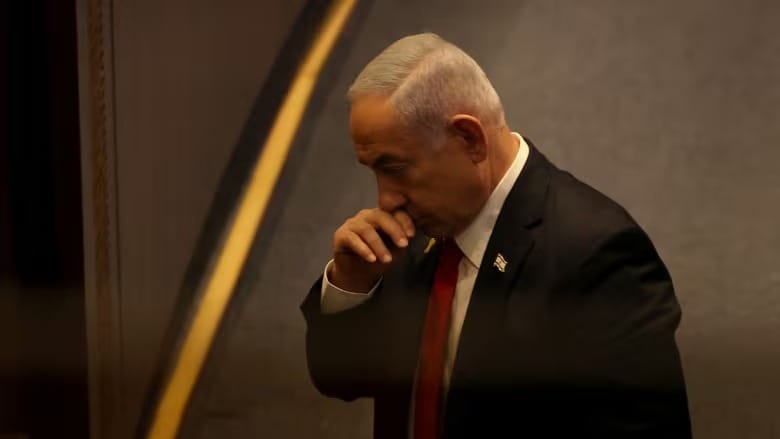Gaza ceasefire talks resume in Doha, but ‘no breakthrough’ expected
Israel’s Mossad spy chief and the CIA director are in Doha for talks in a bid to reach a ceasefire deal, but analysts say a breakthrough is unlikely.

High-Level Talks in Doha Amid Ongoing Conflict in Gaza
Israel’s Mossad chief and the CIA director have traveled to Doha, Qatar, for the first high-level discussions since ceasefire negotiations aimed at resolving the Gaza conflict collapsed in August.
David Barnea and William Burns are expected to meet with Qatari Prime Minister Sheikh Mohammed bin Abdulrahman bin Jassim Al Thani in an effort to revive talks following the assassination of Hamas leader Yahya Sinwar on October 16.
As Israeli Prime Minister Benjamin Netanyahu has intensified military operations and rejected discussions, nearly 100 hostages remain in Gaza. Netanyahu is facing mounting protests demanding action to secure the return of the captives.
On Sunday, protesters interrupted Netanyahu at a memorial for victims of the October 7, 2023, attacks, shouting “shame on you.” Those attacks, executed by Hamas, resulted in at least 1,100 fatalities.
The Qatari prime minister indicated that his country has recently “re-engaged” with Hamas leaders in Doha since Sinwar's death. Earlier, Israel also eliminated Hamas negotiator Ismail Haniyeh during his visit to Tehran in July.
Negotiations for a truce have repeatedly faltered throughout more than a year of conflict, which has claimed nearly 43,000 Palestinian lives.
Hamas is calling for a permanent ceasefire along with the withdrawal of Israeli forces as part of any agreement, whereas Netanyahu seeks military control over specific regions in Gaza.
Sultan Barakat, a professor of public policy at Qatar Foundation’s Hamad Bin Khalifa University, noted, “As long as Israel sticks to its definition of success, there will be no peaceful release of hostages.” He emphasized that the focus has shifted to preventing regional conflict stemming from Israel’s confrontation with Iran rather than ending the violence.
'Not Ready to Make Any Concessions'
During a state ceremony honoring soldiers who died in the conflict, Israeli Defence Minister Yoav Gallant stated that military actions alone will not fulfill the nation’s objectives. He remarked, “In carrying out our moral and ethical duty to return the hostages to their homes, painful compromises are required.”
Israeli media reported that Barnea, the Mossad chief, is visiting with a commitment to “goodwill,” but lacks the authority to alter the status of the Israeli control over the Philadelphi and Netzarim Corridors in Gaza, both of which Netanyahu aims to secure.
Hamas insists on a full withdrawal of Israeli military forces from Gaza, the release of Palestinian prisoners held in Israel, the provision of aid to the entire region, and an end to hostilities.
Luciano Zaccara, an adjunct associate professor at Georgetown University in Qatar, expressed skepticism about achieving a breakthrough, stating, “Even though the Israeli delegation is here, they attacked Iran. So it seems they are not ready to make any concessions to any of their enemies. Israel has decided to push for a definitive military solution against Hamas,” he told Al Jazeera.
Egypt and Qatar have been mediating between Israel and Hamas, leading to a significant breakthrough in November with a prisoner exchange that saw approximately 100 Israeli captives released in return for about 240 Palestinian prisoners.
Analysts predict that the upcoming talks will likely lead to a stalemate, especially with the US elections approaching. In addition to President Joe Biden’s much-publicized plan from May, another proposal is under discussion that involves a temporary ceasefire and aid deliveries in exchange for the release of several Israeli captives in Gaza.
Ronen Bar, head of Israel’s Shin Bet internal security service, visited Cairo last week to discuss the proposal with Egyptian officials.
On Sunday, Egypt suggested a two-day ceasefire in Gaza, proposing an exchange of four Israeli captives for some Palestinian prisoners. President Abdel Fattah el-Sisi stated that discussions should resume within 10 days of implementing the temporary ceasefire to strive for a lasting resolution.
'A PR Exercise'
Hassan Mahmoud Rashad, the new head of Egypt’s General Intelligence Service, has already met with Hamas deputy chief Khalil al-Hayya in Cairo.
Opposition to these talks has emerged from Israeli National Security Minister Itamar Ben-Gvir and Finance Minister Bezalel Smotrich, who labeled temporary proposals as “a gift to Hamas while Israel is in a momentum.”
However, support for a deal has grown as the conflict drags on for more than a year, and families of the captives exert increasing pressure for action. Among the proponents for a deal to release some hostages are Gallant, Transportation Minister Miri Regev, Foreign Minister Israel Katz, and Deputy Prime Minister Yariv Levin.
Hamas officials who recently visited Moscow indicated that if an agreement is reached, two Israeli captives with dual Russian citizenship would likely be among the first released. However, this hinges on Israel's readiness to temporarily halt its military actions.
The situation in Lebanon, following Israeli incursions and bombings, is also expected to be discussed, although separate negotiations are underway to address that conflict. US Secretary of State Antony Blinken met with acting Lebanese Prime Minister Najib Mikati in London on Friday, advocating for civilian protections without explicitly calling for a ceasefire while emphasizing the need for agreements on Hezbollah's disarmament.
Israeli media reported that the Mossad chief informed the CIA director this week that any ceasefire with Hezbollah in Lebanon must also encompass an agreement for the release of captives in Gaza.
Noureddine Miladi, a professor of media and communication at Qatar University, believes the current negotiations in Qatar or Cairo are unlikely to yield substantial results. He remarked, “In my opinion, it is mainly a PR exercise with no substantial results to alleviate the plight of the Palestinians or lead to the release of hostages.” He added, “All of these exercises of talks-for-show are nonsense. Things on the ground are going in just one direction: total control of Gaza by Israel and the establishment of settlements in the Palestinian territory.”





